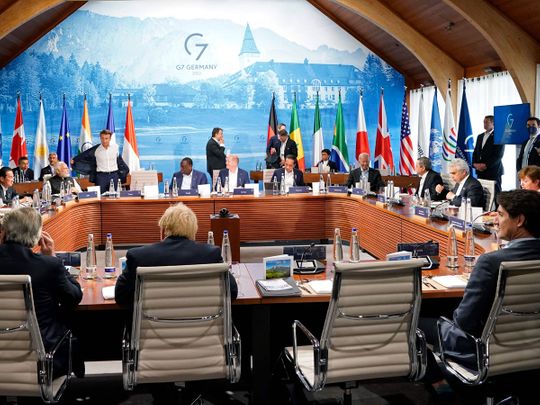
Russia targeted the Ukrainian capital of Kyiv late Sunday with a series of missiles for the first time in weeks, most probably a message to the leaders of the G7, who will expectedly conclude their annual summit in Germany on June 28 with more sanctions on Moscow.
According to Ukrainian military officials, Russian “strategic bombers” were used in the air raid on the capital, a significant development as the prized bombers have rarely been used in the conflict that began on February 24. Meanwhile, the Ukrainian key city of Severodonetsk is now “completely under Russian occupation,” Kyiv confirmed as Russian forces move closer to securing control over neighbouring Lysychansk city.
The Russian advance takes place despite unprecedented sanctions imposed by the United States and its western allies on Moscow in response to the Ukrainian offensive. The sanctions have not worked so far. Nevertheless, leaders of the G7 moved closer on Monday to slap even more sanctions on Russia. US President Joe Biden and British Prime Minister Boris Johnson formally announced that the G7 countries would ban the import of Russian gold, its largest export after energy.
Biden and Johnson believe that sanctions and a multi-billion military aid to Ukraine are the only way to end the war. The G7 nations have already imposed the most stringent sanctions in history on Russia, targeting its biggest banks, most state-owned enterprises, and the oil and gas sector, in addition to the country’s business community.
What is oddly absent in this tragic discourse is the willingness of the G7 to resort to negotiations to end the war. The group has members who can mediate, such as France and Germany, and both have good access to the Russian leadership. China too can play that role.
However, belligerence dominates the conversation. Last month, former US Secretary of State Henry Kissinger at Davos called for a political settlement. His suggestion was immediately dismissed by Ukraine and its western supporters. Yet, nobody has offered an alternative. On the contrary, there seems to be an implicit desire among the Western alliance for a prolonged war. That probably explains the subdued media coverage in the west lately of the humanitarian cost of the war.
Kissinger said he feared the Ukraine war would soon become another world war. Actions from both sides suggest they might be dragging the world on that catastrophic path.







